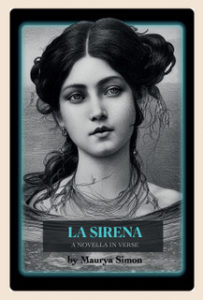 Review by W.J. Herbert
Review by W.J. Herbert
Renunciation and Embrace in Maurya Simon’s La Sirena
The mystical Pacific coupled with the saga of a young girl’s coming-of-age animate La Sirena, a novella in verse by the poet Maurya Simon. The collection, a finalist for the 2023 Vern Rutsala Prize, marries auto-fictional elements with traditional motifs to create a modern riff on a classic 19th century tale. A vibrant contribution to feminist re-castings of myth and fairytale, poems in Simon’s retelling of “The Little Mermaid” employ multiple contemporary voices, but her heroine, richly-textured and magical, is most compelling.
More than an adolescent’s awakening to womanhood, Simon’s reframing of the classic tale is awash in the sensibilities of the Second Wave Feminism of the Sixties: its embrace of potent female sexuality; its disavowal of male dominance. Juxtaposed against Andersen’s “Little Mermaid” whose “skin was soft and tender as a rose petal,” Simon tells us in “Ode to Menses,” that Melusina’s “body grips a newfound power, / as her hair grows tendrils down to / her knees, her breath rank as orchids.” But Melusina has yet to embrace her era’s rebellion against the ideal of female passivity.
In “Mermaids Singing, Each to Each,” her domineering father points to a flotilla of pelicans, saying: “Ah, look, daughter, it’s a little fleet of winged muses. Be like them.” His “delirium of pride, his foolishness,” infuriates Melusina, and she initially refuses his demand that she attempt a dangerous rite of initiation, but he harangues her until she capitulates. Afterward, Melusina returns to her family as, “a white fantasma,” believing that without her prince, “mi destino,” she will die.
In exchange for land legs, she will have to give up her family, her rich ocean life, and her voice with its newfound sibilance. How she will miss uttering profanities without considering pre Sixties notions of impropriety! In “Amo, Amas, Amat:”
Opalescent chimes in her ears; fuck with its ancient
heritage, makes her flush. She feels each daring
word as a glowing ember inside her, pressing
against her breastbone, climbing her throat—so when
she’s angry they flare up (asshole! pendejo!) heating
her cheeks.”
When Melusina decides to drink the sea hag’s potion, she is not hoping, as in the Danish fairytale, that the prince’s love will grant her a share in his immortal soul. As we have already seen in “Forbidden Fruit,” she wants her passion to enact with him a “heated, open-mouthed prayer / that petitions each body’s threshold. / She feels embryonic in her lust, her lips / brushing against the infinite dark.” But Simon’s prince, too, has a modern twist. He is in love, not with another woman, but with a man whom he hopes to marry.
Unlike the heroine of the classic tale, Simon’s Melusina doesn’t bless the pair. Instead, the violent tendencies readers saw earlier in her older sister, now emerge in her. “…her body’s become something that’s / darkly seething, vitriolic, grotesque. Like a giant oyster, / she’s made of her rage a perfectly hard, glinting perla negra.” No longer yearning for the once-idolized, Melusina drinks a potion her loving abuela has given her.
Restored to hybrid form, she returns to her beloved Pacific. In “Butterfly, Backstroke, Breaststroke, Free,” the speaker makes clear that only cradled in its waves will she find physical and spiritual bliss:
As long as she can swim, she’ll never outgrow
her salvation, for water’s the purest baptismal:
it washes the suffering hours out of her senses—
its currents permeate her with zig-zagging bolts
of radiance. As she swims, her heartbeat sings
its tidal song, her skin glows like the inner rose
of a conch’s labyrinth, her hope’s a heliotrope
meadow bluer than the moon-laced shadows…
The conch’s pearl-pink interior an embodiment of her erotic core, Melusina speaks with a new clarity: “I give myself back / to myself.” But more than recognition of her own power, or even the desire to fuse with another in a “heated, open-mouthed prayer,” Melusina wants to immerse herself in a world where her “cobalt veins pulse softly,” as if uttering the language of the divine.
Though “The Little Mermaid” influenced Simon’s writing, the contemporary prose poems and lyrical poetry found in “La Sirena” are a powerful departure from the classic. The modern collection’s social milieu of California in the Sixties blends with ocean’s endless mysteries to produce a richly textured, magical heroine. Embracing her eroticism, rebelliousness, and deep spirituality, Melusina learns to love herself and her imperfect world.
La Sirena by Maurya Simon
Cloudbank Books, 2024, 96 pages, $25 [Hardcover]
9780984999156
W.J. Herbert’s Dear Specimen, (Beacon Press, 2021) was a winner of the 2020 National Poetry Series. Her work also appears, or is forthcoming, in The Atlantic, Best American Poetry 2017 & 2024, The Georgia Review, The Hudson Review, The Southern Review, and elsewhere.
